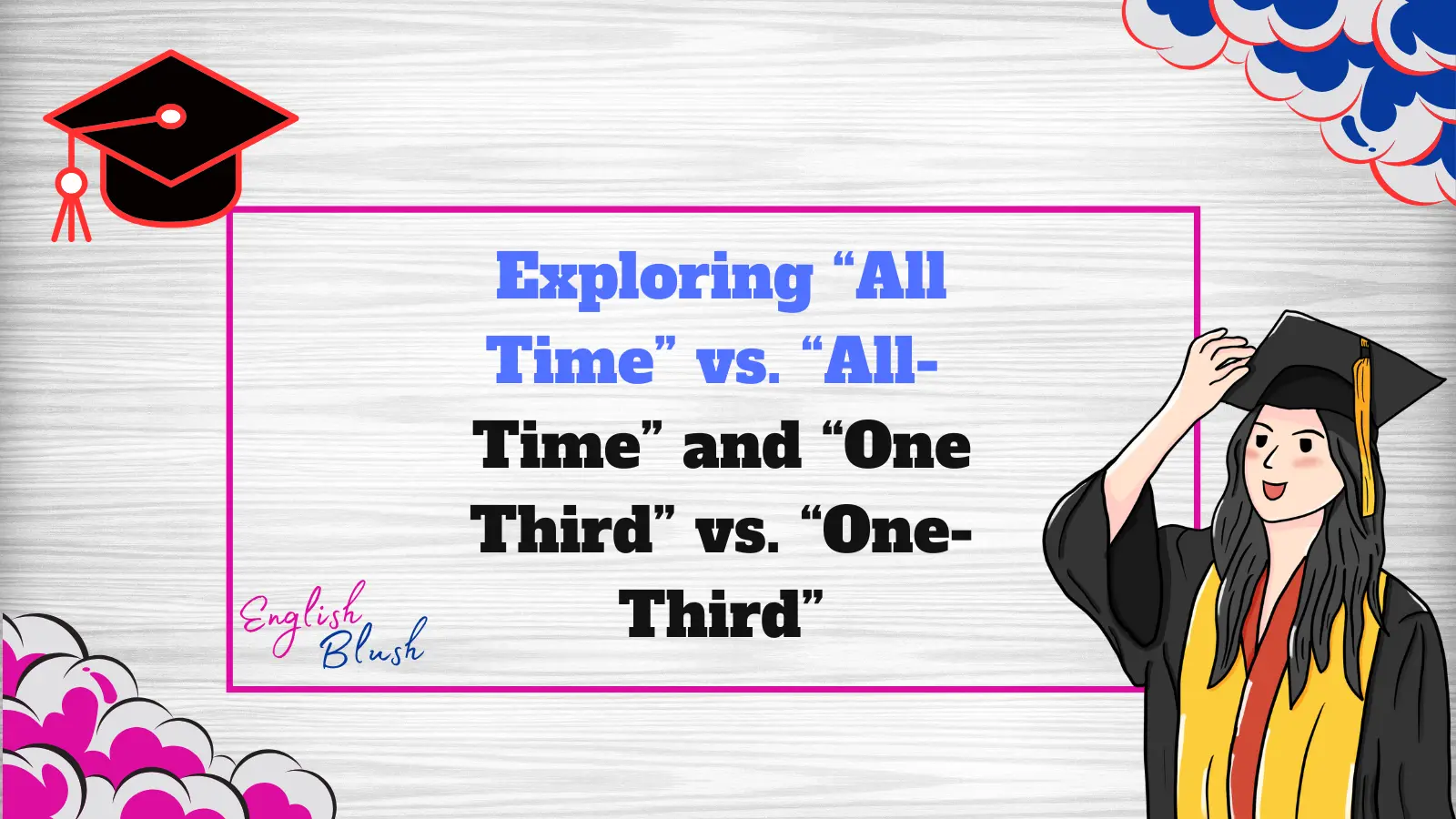The way we use words like “all time” and “all-time”, or phrases like “one third” and “one-third,” can make a big difference in how clear and accurate our writing is. In this article, we’ll break down these terms, exploring their meanings, correct usage, and why proper grammar matters. We will also discuss how these forms align in both UK and US English to ensure consistency.
“All Time” vs. “All-Time”
All time and all-time are closely related but used differently depending on the context:
- “All time” (without a hyphen):
- Used as a noun or a modifier after the verb. It often refers to an indefinite period.
- “All-time” (with a hyphen):
- A compound adjective, used before a noun to describe something record-breaking or exceptional over an indefinite span.
Examples (Correct and Incorrect Usage)
Correct:
- She says this song is her favorite of all time. (Used as a noun phrase.)
- That movie was an all-time hit. (Used as an adjective.)
- Michael Jordan is considered the best player of all time in basketball. (Correct as a noun phrase.)
- He just broke the all-time high score. (Correct as a compound adjective.)
Incorrect:
- She says this song is her favorite of all-time. (Incorrect because “all time” does not need a hyphen as a noun.)
- That movie was an all time hit. (The hyphen is needed here since it’s used as an adjective.)
- Michael Jordan is considered the best player of all-time in basketball. (Wrong: No hyphen is necessary for a noun phrase.)
- He just broke the all time high score. (Wrong: The hyphen is necessary before “high score.”)
Why It Matters: Grammar rules provide clarity. Incorrect usage can confuse readers about whether “all time” describes a period or modifies a noun.
“One Third” vs. “One-Third”
The distinction between “one third” and “one-third” is subtle but significant.
- “One third”:
- Usually functions as a fraction or verb phrase without needing a hyphen.
- “One-third”:
- A compound adjective or noun form when modifying another word or emphasizing unity.
Examples (Correct and Incorrect Usage)
Correct:
- One third of the cake is already eaten. (Used as a fraction without a hyphen.)
- Only one-third of the participants showed up. (Correct as a compound adjective before “participants.”)
- She donated one-third of her earnings to charity. (Used as a noun to describe a portion.)
- One third of the students passed the test. (Correct when referring to a fraction.)
Incorrect:
- One-third of the cake is already eaten. (Wrong hyphenation because this is not modifying another word.)
- Only one third of the participants showed up. (Needs a hyphen because it’s a compound adjective.)
- She donated one third of her earnings to charity. (A noun portion should still use the hyphen for clarity.)
- One third of the students passed the test. (If consistent emphasis is on unity, hyphenation is expected.)
Why It Matters: Hyphens ensure that multi-word phrases function as a single unit. Misusing these forms can alter meaning or disrupt flow.
Consistency Between UK and US English
Fortunately, these rules apply across both UK and US English. While spelling variations exist (e.g., “colour” vs. “color”), punctuation rules around hyphenation remain consistent. This makes the application of “all-time,” “all time,” “one-third,” and “one third” straightforward in both styles of English.
Why Grammar Rules Matter
Understanding and applying grammar rules enhances:
- Clarity: Readers can easily interpret your message.
- Professionalism: Proper usage conveys attention to detail.
- Consistency: Following rules creates uniformity, especially important in formal or published writing.
Summary of Key Points
- “All Time” refers to an indefinite period and functions as a noun.
- “All-Time” is a compound adjective that modifies a noun.
- “One Third” can act as a fraction or verb phrase and does not use a hyphen.
- “One-Third” is a compound adjective or unified noun requiring a hyphen.
- Both UK and US English follow similar rules regarding hyphenation for clarity and correctness.
By understanding these distinctions, you can write more confidently, ensuring your meaning is precise and impactful. Use these terms thoughtfully and let good grammar elevate your communication.





